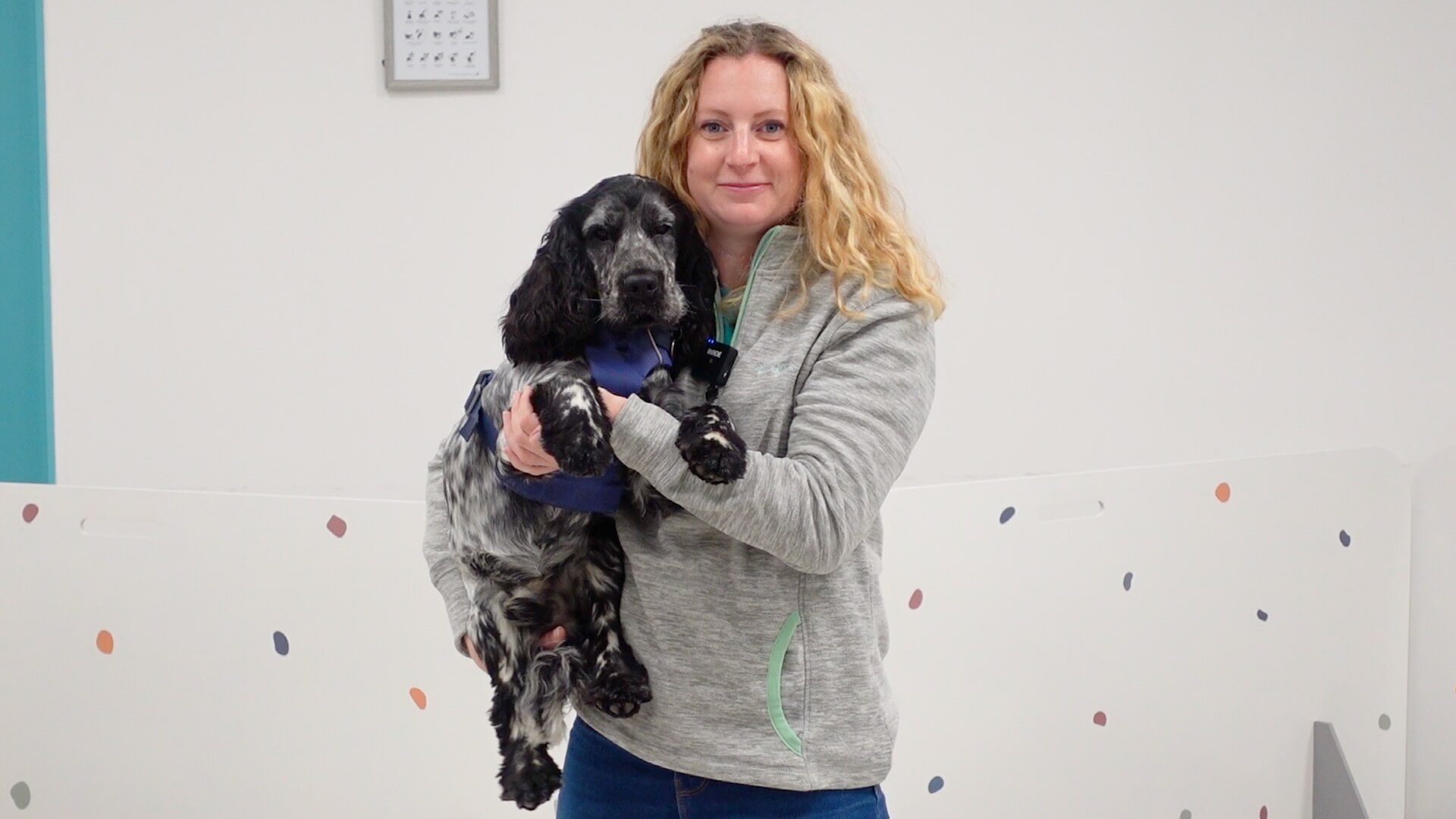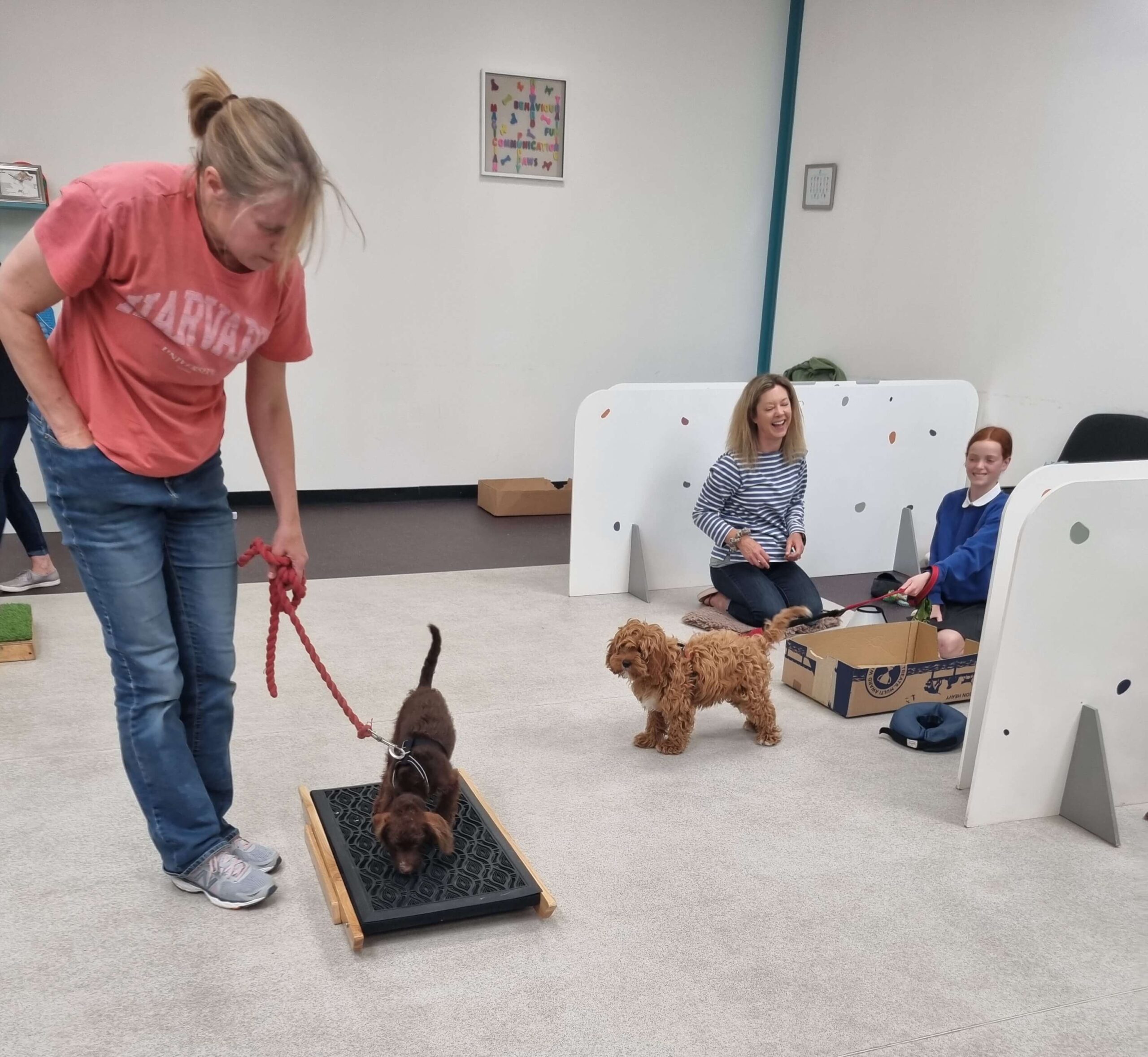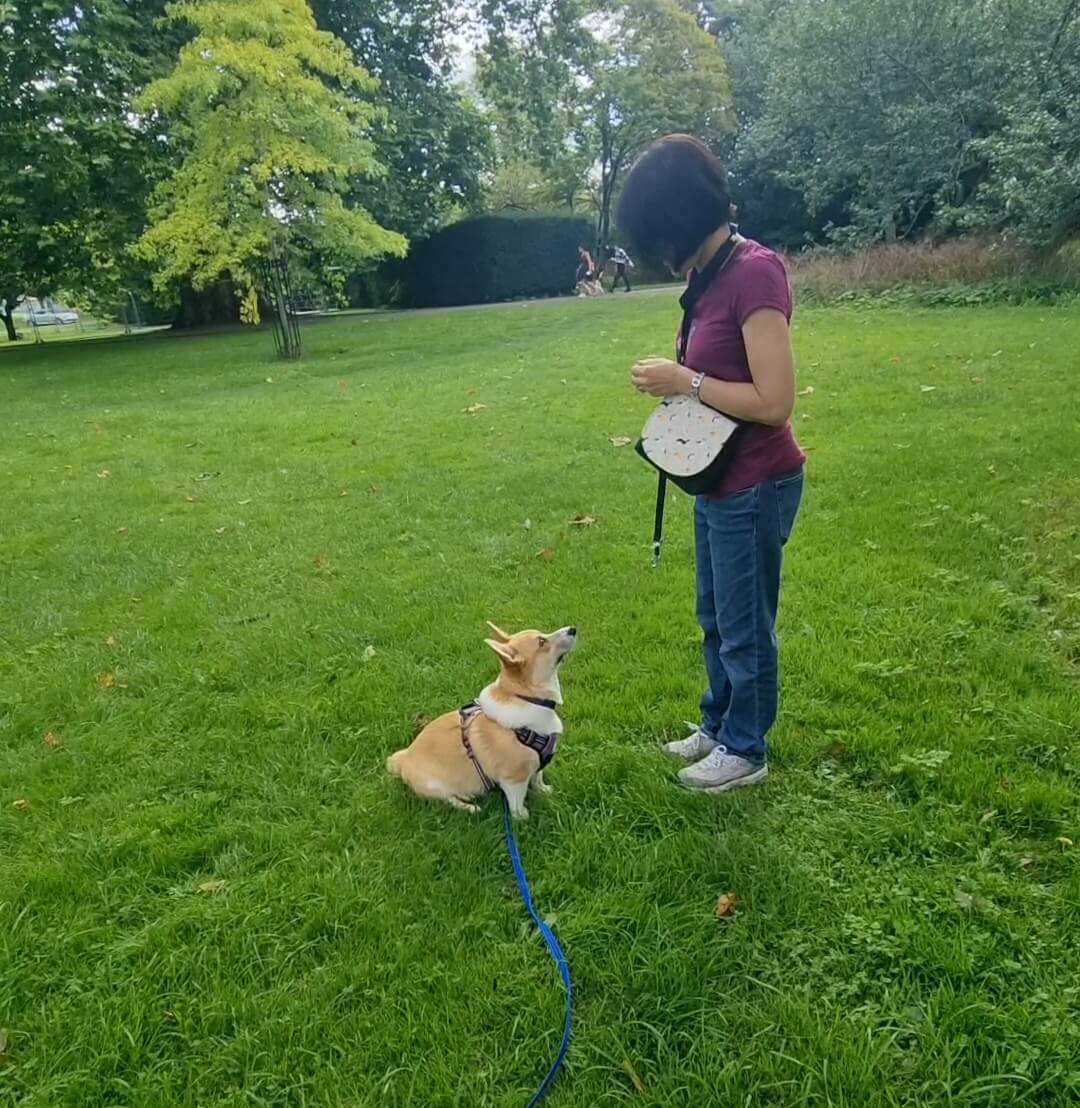Who said you can’t teach an old dog new tricks?
Hi, I’m Amy. I am a dog and puppy trainer based at my very own classroom on Love Lane in Cirencester but I also cover Cricklade, Swindon, Wootton Bassett, Malmesbury, South Cerney, Stroud, Tetbury and surrounding areas.
How can I help your relationship with your dog?
I offer a range of services including group training classes, one to one training packages on specific difficulties like reactivity towards other dogs and loose lead walking, as well as one to one puppy training and bespoke sessions.
Why is this dog training with a difference?
Training is of course important, but so is your and your family’s relationship with your dog. Training should enhance this rather than jeopardise it. Training will focus on giving your dog the life skills they need to be part of the family using reward based, scientifically proven methods, it certainly isn’t magic or mysterious. Training should be accessible to everyone, regardless of
ability.
Animals cannot tell us what they feel, but their behaviour communicates how they feel in certain situations. Where a dog may be showing aggression for example, this is the outward behaviour we see, however the underlying emotion is likely to be fear or anxiety. By doing our best to establish how the animal feels, reveals what is driving the particular behaviour and how best to work with the animal. By having an awareness of the subtle behaviours your dog uses to communicate i.e. the ‘whispers’, there is no need for your dog to ‘shout’.
I don’t just recommend positive reinforcement training, but also that we take into account the dog’s individual needs and behaviours, behaviour is communication.
Where a dog may be showing aggression for example, this is the outward behaviour we see, however the underlying emotion is likely to be fear or anxiety. By doing our best to establish how the animal feels, reveals what is driving the particular behaviour and how best to work with the animal.
By having an awareness of the subtle behaviours your dog uses to communicate i.e. the ‘whispers’, there is no need for your dog to ‘shout’.
Like us, a dog needs to feel secure before they can learn, there may be changes to the environment that need to be made before your dog can take on new learning.
There’s also just too many advantages to using reward based training to cover all of them here:
- You and your dog are a team, your dog will enjoy working with you
- Your dog will retain their new learning
- It helps them feel confident to offer behaviours that we like
- They feel positive about you, your family, your home and their environment.
Luckily I’m not the only one who recommends positive reward based methods, all the large national welfare organisations and veterinary associations around the world recommend it, even the law recommends kind, ethical, reward based training and denounces the use of aversive tools.
British Veterinary Association
‘Under the UK Animal Welfare Acts humans responsible for animals must ensure that the animals under their care are protected from unnecessary pain, suffering, injury and disease. This includes unnecessary pain or suffering inflicted with inappropriate and aversive training methods or containment systems.’
‘Defra’s Code of Practice for the Welfare of Dogs also advises that ‘good training can enhance a dog’s quality of life, but punishing a dog can cause it pain and suffering … All dogs should be trained to behave well, ideally from a very young age. Only use positive reward-based training. Avoid harsh, potentially painful or frightening training methods’.
Full statement here: full-bva-policy-position-on-the-use-of-aversive-training-devices-in-dogs-and-cats.pdf
Dogs Trust
‘Training with rewards is the best way to encourage your dog to behave as you would like. For example, learning to settle themselves down when people are busy, instead of looking for attention. The reasons to train your dog in this way include:
- science tells us that reward-based training is the best way for dogs to learn
- training with rewards is fun, and helps build a positive bond between dog and owner
- owners that train using rewards report fewer behaviour problems in their dogs
- reward-based training can help build confidence and encourage dogs to think for themselves’
RSPCA
‘We promote and recommend reward-based training techniques that dogs like or enjoy and have been shown to be very effective in achieving long-term change in behaviour without compromising dog welfare’.
American Veterinary Society of Animal Behavior
‘Evidence supports the use of reward based methods for all canine training. AVSAB promotes interactions with animals based on compassion, respect, and scientific evidence. Based on these factors, reward-based learning offers the most advantages and least harm to the learner’s welfare. Research supports the efficacy of reward-based training to address unwanted and challenging behaviors. There is no evidence that aversive training is necessary for dog training or behavior modification’.
At a very basic level there are only two ways you can motivate a dog: with food (positive reinforcement) or fear (punishment or the fear of consequences). I know which method I’d want my guardian to choose if I was the dog.
Sure there are other ways to train a dog that may be advocated by other trainers like lead corrections (sometimes referred to as lead ‘pops’), rattle cans, water pistols, spray collars, prong collars etc working on the premise you startle the dog out of doing a behaviour or punish the dog for exhibiting that behaviour. Some even still refer to very outdated methods like pack leadership or dominance. Punishment may stop the outward behaviour but it doesn’t address the underlying emotional state of the animal, the reason why they were showing that behaviour in the first place.
Well what’s the problem if it stops the behaviour? Behaviour is communication, nothing good comes from supressing behaviour. Using punishment has been shown to increase the likelihood of your dog showing aggression, it certainly doesn’t communicate to your dog what behaviour we would prefer them to do, it’s like putting a band aid on a bullet hole. You may stop the bleeding with the band aid but ultimately the underlying damage is not repaired and will cause further complications later on. To put it another way its like shaking a fizzy drink, all is well while the cap is on, but if the cap is removed, it makes a mess. Rarely does punishment lead to long term positive behaviour change.
Coercive and aversive training methods are also a quick way to dissolve any relationship you have already worked on between you and your dog, it breaks the trust, you become unsafe from your dog’s perspective, there are so many situations we need our dogs to trust us and feel safe with us in our confusing human world.
Regardless of training styles, there’s a heck of a lot more to dog training than just throwing sausage at them or punishing them. Rewards need to be used in a considered way, which is why professional assistance from a qualified trainer is helpful. I often hear ‘I’ve tried using treats and it didn’t work’ but usually we need to look a lot more carefully at dog body language, how rewards are used, what reward is being used, the dog’s underlying emotional state, what motivates them, how their environment can be managed better, question if they have underlying pain/medical condition and are their needs not being met in some way. We need to set training up to allow the dog to succeed without flooding or overwhelming them.
You might be thinking that all sounds well and good but what if you just end up with a dog that only follows a cue if there’s a treat in it for them? For me it’s really not the end of the world, if it means my dog jumps in the boot of the car when I ask him to then I definitely can cope with the odd treat in a pocket that ultimately goes through the wash with a stray poo bag.
Yes, of course initially your dog will need a reward every time when teaching a new behaviour, remember behaviour is communication, you giving your dog a reward is you communicating that they have done it right. Once they have got it, then you can phase out the treat and use other reward methods like play, or other ‘life’ rewards. However don’t be in a rush to do this, it takes time for behaviours to become established and once your dog is following cues well, you’ll probably find rewarding their efforts pays off in dividends.
We ourselves like to feel our efforts are rewarded and appreciated, we like to be ‘paid’ whether that be our pay check at the end of the month or even if we do voluntary work, we are getting a sense of self fulfilment. We like to feel appreciated by our partners, by our children, by our friends, this may be in the form of a thank you, a hug or a nice gesture. The animals we share our lives with are no different. A dog doesn’t necessarily appreciate a thank you card, unless they like shredding cardboard, so we need to show them in other ways that they find rewarding.
There are some situations I will always continue to ‘produce the goods’ in, like with recall. If your dog has found something AMAZING to sniff, roll in, eat, or are playing with their best friend, unless you have practiced recall in similar situations during training and have a good positive reinforcement history of the recall being rewarded, you are unlikely to be successful and may resort to plain old bribery, coercion, frustration, threats or abandoning the cause altogether.
It’s important to note that dogs will be motivated by different things, therefore some dogs prefer food, while others prefer play with toys, fuss, free time off the lead, opportunity to sniff, opportunity to play with another dog, chase games, tug games, hide and seek, find it games etc.
Did you know I offer a video only online Fundamentals course?
If you live a busy lifestyle and would prefer to train in your own time and at your own pace, then this may be for you! This course covers all the essentials, although aimed at puppies it is suitable for any dog in need of the basics! It also compliments the face to face puppy classes course perfectly too for any family members unable to attend.
Succeeding Together
This is a fantastic resource, Succeeding Together comprises of a group of professionals including Trainers, Behaviourists, Holistic Groomer, Nutrition, and Guest Speakers in Veterinary Physiotherapy, Galen Therapy, McTimoney, Dog Walkers, Botanical Self Healers, Veterinary Care, Trauma Care and much more…
We Provide a safe space for questions, learning and you get Professional Support and Advice in ONE Online Community. No dangerous hit and run advice so you can have the correct, reliable and trustworthy information when you need it ABOUT ANYTHING DOG.
There is a private FB group that we monitor and reply with advice on (everything is written from the dog’s perspective) and we fortnightly Q and As (not via Facebook) so there is plenty of individual help and advice available.
All clients have free lifetime access!

Latest offer
If you attend face to face puppy classes or puppy 1:1s, you get 50% off the online video course (usually £70)

I am here to help,
You may be struggling on where to start with training, worried or anxious about your dog’s behaviour or not sure what option would suit you and your dog best. Get in touch today so we can make a plan together.

